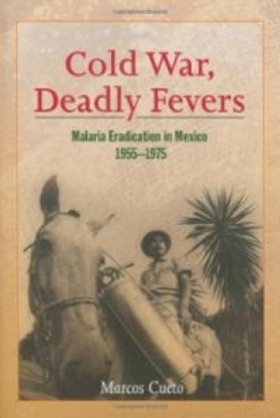“This is a valuable book for all public health professionals. Highly recommended.”—Choice
“A meticulously researched, succinct, and artfully crafted narrative about malaria eradication in Mexico during the Cold War.”—Heather L. McCrea, Journal of Historical Geography
“Should be compulsory reading for public health officials.”—Thomas P. Weber, British Journal for the History of Science
“More than just a case study of the successes and failures of malaria eradication in Mexico, Cold War, Deadly Fevers suggests what might be done to improve public health in developing nations.”—Michael R. Hall, Journal of Third World Studies
“Cueto, a distinguished and highly respected historian of medicine and public health, frames his concise, yet detailed, history of malaria eradication programmes in Mexico within a larger argument about the overall goals of, and approaches to, public health in the developing world, both past and present.”—Global Public Health
“An excellent case study of the mid-twentieth-century multilateral campaign in Mexico to eradicate malaria. It skillfully places the Mexican effort in the context of international political history and health policy. It is essential reading for public health professionals and anyone interested in Mexican history, the history of medicine, or U.S. foreign policy.”—Bulletin of the History of Medicine
“A well-crafted and complex study that offers important lessons on the history of international health and foreign aid. One of the greatest strengths of this impressive work, however, is Cueto’s insight into the motivations and attitudes of the people who created the program, those who implemented it, and those who were deemed its beneficiaries.”—Hispanic American Historical Review
“Anyone with an interest in international development, especially in Latin America, and a belief that history holds important lessons for building sustainable efforts in international development, should read it. Cueto excels in analyzing historical processes at multiple scales, from the global, to the national, to the local.”—Geographical Review
“Dr. Cueto’s excellent and well-informed exploration of malaria—not merely as a disease but as a social, economic and human problem—makes this book required reading.”—Filiberto Malagón, Philosophy, Ethics, and Humanities in Medicine (June 2008)
“This work is very important. It is the first scholarly and book-length study of malaria eradication in Latin America how actually played out on the ground and how they were framed by Cold War ideologies and imperatives.”— Alexandra Stern, Center for the History of Medicine, and Medical School, University of Michigan
“The work is a welcome and significant contribution to the field of the history of public health as well as a critical guide for public health practitioners who seek more beneficial global health paradigms.”—Alexandra Puerto, A Contracorriente: A Journal on Social History and Literature in Latin America




